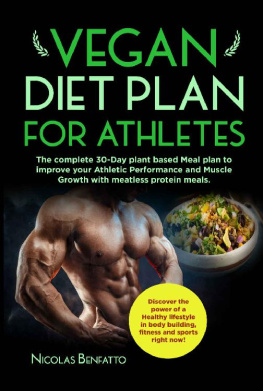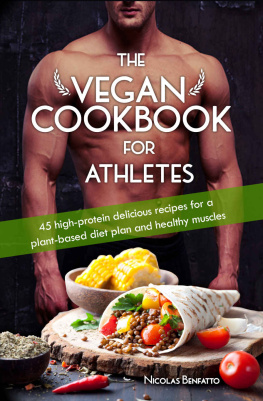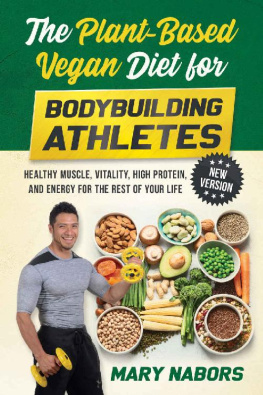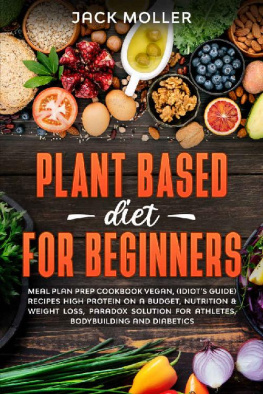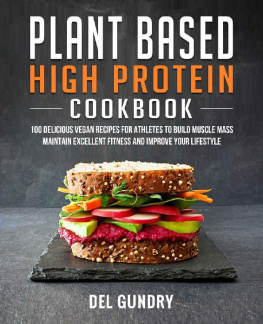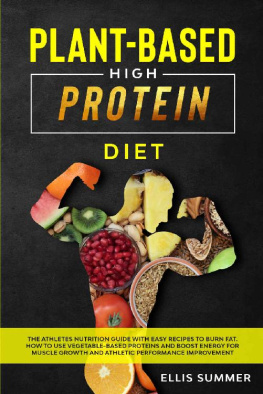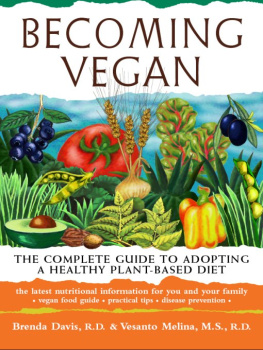Vegan diet plan
for Athletes
The complete 30-day plant based meal plan to improve your Athletic Performance and Muscle Growth with meatless protein meals.
Discover the power of a Healthy lifestyle in body building, fitness and sports right now!
by
Nicolas Benfatto
Copyright 2019 by Nicolas Benfatto
All rights reserved.This document is geared towards providing exact and reliable information with regards to the topic and issue covered. The publication is sold with the idea that the publisher is not required to render accounting, officially permitted, or otherwise, qualified services. If advice is necessary, legal or professional, a practiced individual in the profession should be ordered. From a Declaration of Principles which was accepted and approved equally by a Committee of the American Bar Association and a Committee of Publishers and Associations. In no way is it legal to reproduce, duplicate, or transmit any part of this document in either electronic means or in printed format. Recording of this publication is strictly prohibited and any storage of this document is not allowed unless with written permission from the publisher. All rights reserved. The information provided herein is stated to be truthful and consistent, in that any liability, in terms of inattention or otherwise, by any usage or abuse of any policies, processes, or directions contained within is the solitary and utter responsibility of the recipient reader. Under no circumstances will any legal responsibility or blame be held against the publisher for any reparation, damages, or monetary loss due to the information herein, either directly or indirectly. Respective authors own all copyrights not held by the publisher. The information herein is offered for informational purposes solely, and is universal as so. The presentation of the information is without contract or any type of guarantee assurance. The trademarks that are used are without any consent, and the publication of the trademark is without permission or backing by the trademark owner. All trademarks and brands within this book are for clarifying purposes only and are the owned by the owners themselves, not affiliated with this document.
Disclaimer
All erudition contained in this book is given for informational and educational purposes only. The author is not in any way accountable for any results or outcomes that emanate from using this material. Constructive attempts have been made to provide information that is both accurate and effective, but the author is not lialble for the accuracy or use/misuse of this information.
Table of Contents
INTRODUCTION
Food is the process by which we take from abroad a series of substances that are necessary for nutrition. These substances are found in foods that are part of our diet.
Nutrition is the set of processes by which the person ingests, absorbs, transforms, and uses substances.
It is shown that food and health walk hand in hand since a proper diet helps promote health and prevent disease. There are many studies that relate to diet and chronic diseases (cardiovascular, obesity, diabetes mellitus, etc.) proving that inappropriate food is one of the main determinants of the development of these diseases.
The type of food we eat, as well as its quantity, have a huge influence on our health. Unfortunately, it is very easy to eat poorly if you choose a diet that contains too many inappropriate foods, for example, fast foods high in fat, and an insufficient amount of healthy foods, such as fruits and vegetables.
The food is one of the pillars of our health. Through food, we get the energy and nutrients we need, so it is vital that we make our diet a priority. Unfortunately, today, we forget its importance due to the short time we have and the influence of social changes.
Any diet aims to maintain or improve our health, and therefore our physical appearance, this being a reflection of our best or worst state. Whether to lose weight, gain weight, avoid some foods, or supply vitamin deficiencies, diets should always seek balance. The most advisable thing is to receive the advice of a professional nutritionist who elaborates on a menu adapted to our specific characteristics.
WHAT IS A HEALTHY DIET?
According to most dietitians, there are no "bad" foods, but "unhealthy" diets. A healthy diet is achieved by eating the right amount of food in the right proportion, with continuity.
Eating an adequate proportion of food from the main groups forms the basis of daily well-being, and will reduce the risk of long-term illness.
A diet is the amount of food that a living being provides to your body. The diet, therefore, defines our nutritional behavior; that is, it is a set of nutrients that the body absorbs after the usual consumption of food.
Diet is a habit and a way of life. It is true that most of the time, this term is used to refer to special regimes to lose weight or to combat certain diseases, although the reality is that these cases represent changes in the diet and not a diet in itself.
On the other hand, it is considered that a diet beneficial to human health, that is, a balanced and balanced diet, must contain enough calories and nutrients essential for the proper growth and development of the organism in each of the stages of life. Healthy eating should, therefore, provide carbohydrates, proteins, and fats (in addition to vitamins and minerals) in the right proportions to reduce the risk of chronic diseases.
When feeding, we must take into account a series of criteria such as those shown below:
Choose a varied diet that includes foods from all groups: fruits, vegetables, dairy, meat, fish, eggs, sugars ...
Maintain an adequate balance in the consumption of food, that is, it must be avoided that the excessive intake of a certain food displaces the consumption of another equally necessary.
Eat-in moderation. This allows us to maintain the right weight and avoid obesity and its terrible consequences.
Eat to enjoy it. Currently, the human being does not eat only to survive but also enjoys doing so. Therefore, our diet, always incorporating foods that are healthy and nutritious, should be set up so that we feel like eating it. A diet that we don't like can end up becoming a real martyrdom.
Therefore, at the time of feeding, we must bear in mind the following criteria:
Choose a varied diet that includes foods from different groups: cereals, fruits, vegetables, oils, dairy products, meats, fish, eggs, sugars, ... because the nutrients are distributed in food and can be obtained from many combinations of the same.
Maintain an adequate balance so that excessive consumption of food does not displace or replace another also necessary.
Moderation in the quantities consumed, to maintain the appropriate weight and avoid obesity and its consequences.
Take into account our particular eating habits, since we do not eat only by physical need, but also do it to enjoy. Therefore, our diet, in addition to being healthy and nutritious, must be configured in such a way that we feel like eating it and that we include foods that we are accustomed to eating.
The types of diet we can follow to improve health
Mediterranean diet
The Mediterranean diet is one that best suits the objectives that a balanced diet must meet. It is based mainly on the consumption of foods of plant origin, using in moderation foods of animal origin. In short, it recommends increasing the consumption of cereals, fruits, vegetables, vegetables, legumes, including olive oil, fish in the diet, and moderating the consumption of meat and animal fats.

